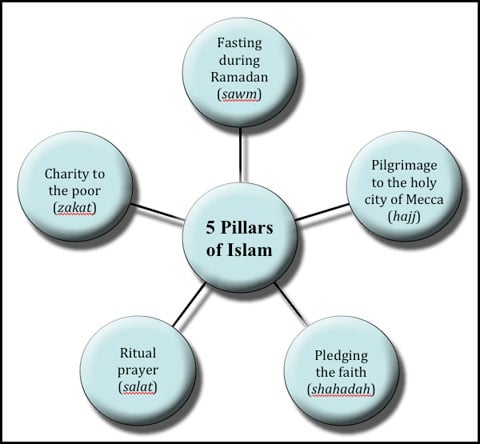- Trending:
- Pope Leo Xiv
- |
- Israel
- |
- Trump
- |
- Social Justice
- |
- Peace
- |
- Love

RELIGION LIBRARY
Islam
Principles of Moral Thought and Action
| Five ethical categories | |
| The obligatory | (wajib) |
| The prohibited | (haram) |
| The supererogatory | (mandub) |
| The disfavored | (makruh) |
| The indifferent | (mubah) |
Muslim ethical thinking begins from the premise that the most fundamental relationship in the life of human beings is their relationship with God. Accordingly, the first subject of ethics is to understand the nature of the relationship between humanity and God. Muslim theologians have categorized all human acts from this perspective as falling into one of five ethical categories: the obligatory (wajib); the prohibited (haram); the supererogatory (mandub); the disfavored (makruh); and the indifferent (mubah).
This overriding concern with the relation of the human to the divine is manifested most clearly in Islamic ritual law, which is always the first topic discussed in any work of Islamic law, and generally takes up roughly a quarter of the pages of any treatise on Islamic law.  The most important elements of Islamic ritual life are known as the "Five Pillars of Islam," and impose, as moral obligations, the requirement to witness to the truth of Islam by declaring publicly that there is no god except for God and that Muhammad is God's messenger; to pray in the specified manner the five daily prayers—at dawn, at noon-time, in the afternoon, at evening, and at night-time—in their specified times; to fast from food, drink, and sexual intercourse during the daylight hours of the month of Ramadan, the tenth month of the Islamic lunar calendar; to dedicate a portion of one's wealth (customarily believed to be 2.5 percent) for poor-relief annually; and to perform the pilgrimage to Mecca once in one's lifetime if one has the means to do so. Islamic ritual law also includes countless supererogatory ritual acts, observance of which constitutes the bulk of the spiritual discipline of the Sufi orders.
The most important elements of Islamic ritual life are known as the "Five Pillars of Islam," and impose, as moral obligations, the requirement to witness to the truth of Islam by declaring publicly that there is no god except for God and that Muhammad is God's messenger; to pray in the specified manner the five daily prayers—at dawn, at noon-time, in the afternoon, at evening, and at night-time—in their specified times; to fast from food, drink, and sexual intercourse during the daylight hours of the month of Ramadan, the tenth month of the Islamic lunar calendar; to dedicate a portion of one's wealth (customarily believed to be 2.5 percent) for poor-relief annually; and to perform the pilgrimage to Mecca once in one's lifetime if one has the means to do so. Islamic ritual law also includes countless supererogatory ritual acts, observance of which constitutes the bulk of the spiritual discipline of the Sufi orders.
| Social interactions (mu 'amalat) | Ritual |
| *concerns human welfare in secular world *assumes human ability to understand and interpret divine commands |
*concerns relationship between human and divine |
Islamic ethics, however, is also concerned with social interactions, mu‘amalat in Arabic. Mu‘amalat are sharply distinguished from ritual in Islamic ethics insofar as Islamic law presumes that when regulation speaks to human interactions, it does so to further human welfare in the secular world rather than to regulate the relationship between the human and the divine. It is the assumption that revelation's regulation of social life is essentially comprehensible to human reason, which makes feasible the project of an expansive Islamic law grounded in human interpretation of the divine command.
For Sunni Muslims at least, this means that much of Islamic law—especially as applied to social interactions—is largely a product of human reflection upon the message of revelation, with the inevitable result that differences of opinion regarding what revelation requires for any particular situation abound. In theory, Shi‘i Muslims, because of their adherence to the concept of a divinely guided imam, are not in need of human interpretation of revelation, with all its foibles. In practice, however, because the great majority of Shi‘i Muslims are Twelvers and believe that the last Imam is currently in hiding, they too are required to construct the rules of Islamic law using interpretive techniques.
| Fundamental norms (daruri) | Secondary norms (ijtihadi) |
| set forth explicitly in revelation | based on scholarly interpretation |
| include religious doctrine (unity of God, accountability before God) |
include most doctrines and ethical obligations |
| also include practical obligations ("Five pillars of Islam," dietary restrictions) |
Because Islamic ethics requires the use of interpretation (ijtihad) to extend revelation to novel cases, Islamic ethics makes a broad distinction between fundamental norms (daruri) and secondary norms (ijtihadi). The former are set forth explicitly in revelation and include both elements of religious dogma—such as the simple unity of God, the inevitability of resurrection after death, and the accountability of individuals before God—as well as practical obligations, such as the "Five Pillars of Islam" and the obligations to refrain from illicit sex, eating pork, or drinking grape-wine. Most Islamic doctrines and ethical obligations, however, are secondary (ijtihadi) and are derived through the interpretation of scholars. Muslim scholars have engaged in a tradition of scholarly interpretation for over one thousand years, leaving a rich legacy of theological, ethical, and legal doctrines.
For the vast majority of the world's Muslims, including English-speaking Muslims, this legacy is not necessarily relevant to their lived experience of Islam. Their lived experience of Islam is instead shaped by the fundamental norms of Islam. Accordingly, their understanding of Islam is largely limited to Islam's most basic theological, ethical, and legal doctrines, with the result that the vast majority of Muslims have a very pragmatic relationship to formal Islamic doctrines. Muslims are more likely to have some familiarity with the technical doctrines of ritual law and family law than other areas of Islamic law precisely because of this pragmatism.
Given the centrality of ritual practice in Islam and the importance of family life, most Muslims will want to know enough about these two topics to comply with the minimum requirements of their religion. Even in these two areas, however, it is unlikely that the average Muslim, even one that is highly observant, will have detailed familiarity with the relevant legal norms, much less the quite complex theological and ethical tradition that undergird many legal rules. Accordingly, most Muslims are certainly ignorant of, and indifferent to, problematic aspects of historical Islamic law such as slavery and the pre-modern rules of warfare (jihad).
Because of this pragmatic understanding of Islamic law, English-speaking Muslims generally have not made any demands for the public recognition of Islamic law except in the limited case of family law, where, given the contractual nature of modern family law, it would appear relatively simple to incorporate Islamic family law principles within contemporary family law regimes without violating any person's fundamental rights as a citizen.
The most basic building block of ethical conduct in human interaction in Islamic ethics is that of the contract: the free and knowing exchange by two individuals of items of value on a basis of equality and mutual advantage. Accordingly, the contract of sale was the paradigm for justice in traditional Islamic ethics, even serving as the basic model upon which the rules of marriage were developed. Justice in the traditional Islamic conception, although grounded in the autonomy of the individual's will, was not co-equal to it. Thus, the consent of an individual to a trade that Islamic law deemed unjust, for example, an enslavement contract, or a gambling contract, was not a sufficient reason to enforce the contract: consent was always a necessary condition for the validity of transactional or quasi-transactional interactions, but the terms of those interactions had to satisfy certain objective standards of Islamic justice.
| Muslim Ethical Obligations | |
| Political | power of the state to regulate the conduct of its citizens through law |
| Expressive | obligation of individuals to commend good conduct and condemn evil conduct |
| Moral | obligation of each Muslim to love good and reject evil in their hearts |
Finally, Muslims have a collective obligation to exhort one another to abide by the ethical and moral obligations of Islam. This duty, known as the obligation to command the good and forbid the evil, is understood to entail three dimensions. The first is the political and manifests itself in the power of the state to regulate the conduct of its citizens through law. The second is expressive, and manifests itself in the obligation of individuals, through public and private moral exhortation, to commend good conduct and condemn evil conduct. The third is purely moral, and manifests itself in the obligation of each Muslim to love good and reject evil in their hearts.
Adherence to the norms of the shariah is primarily a function of the personal commitments of individual Muslims, and only secondarily a matter of particular state laws. Because the commitment to the shariah is first and foremost an ethical commitment, Muslims can and do adhere to the commands of the shariah—particularly its ritual commands—whether or not they are located in an Islamic state.
Study Questions:
1. How are all Muslim acts categorized?
2. Why are the five pillars of Islam important to moral thought and action?
3. What are Mu’amalat? Why are they important?










